Smart clothes go green
Published 22 September 2015 by Nicolas Barrial
To open Fashion Tech Week in Paris, the two start-ups Wair and WearHacks organized a Greenathon on September 19-20 that combined fashion, tech and ecology.
Some 40 participants turned up on September 19-20 for the green hackathon at La Paillasse, the biohacklab in Paris. Co-hosted by Wair, a start-up developing an anti-pollution scarf, and Wearhacks, an organizer of hackathons around connected objects, the event took place during the 3rd Fashion Tech Week in Paris, through September 26.
The participants’ challenge : “How to create ecologically responsible clothes and accessories using textile technology and innovation.”
A suitcase full of clothing and connected objects
Three spaces were available to the participants for 54 hours of competition, including TEXTIlab founder Alice Gras’s Hall Couture studio (at La Paillasse) and Mon atelier en ville, just a few minutes’ walk away. At La Paillasse, the French manufacturer of 3D printers Dagoma was running an armada of its little machines.
Gaël Peron, one of the mentors specialized in Arduino, immediately remarked that the Greenathon was particularly well equipped : clothes, of course (Hippy Market), but also an impressive collection of connected object kits from WearHacks : Pebble, Myo Armband, Muse Headband…
Un équipement à la pointe de la tech avec des #wearables de dingue pour le GREENATHON ! MERCI @WearHacks #IoT pic.twitter.com/WbGaE7nDx4
— WAIR (@WAIRfr) September 20, 2015
Although people still had to know how to build these kits. A good half of the participants from the fashion world (either pros or students) didn’t feel geeky enough to master the most technical tools, despite help from coding students from Simplon and a few engineers.
The LilyPad Beginner’s Kit, an Arduino world created by Leah Buechley and dedicated to accessories and clothing, showed up in most of the projects, while many of the participants also expressed interest in a corn-based plastic presented by Arteko.
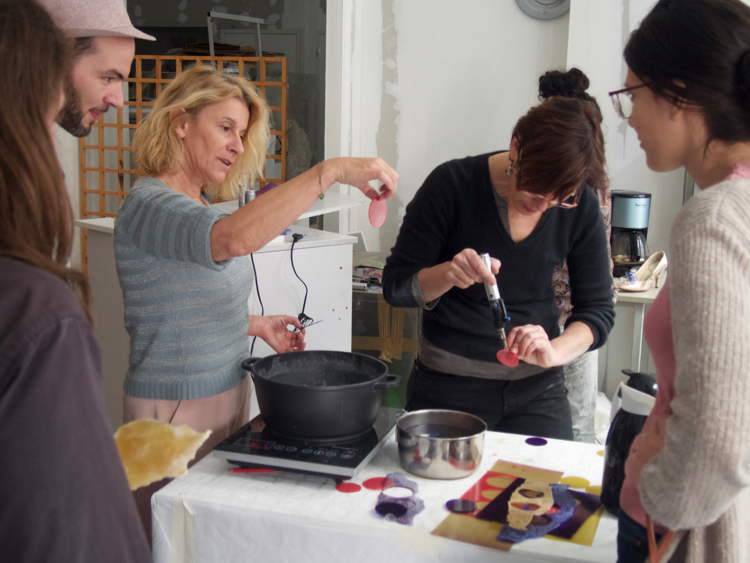
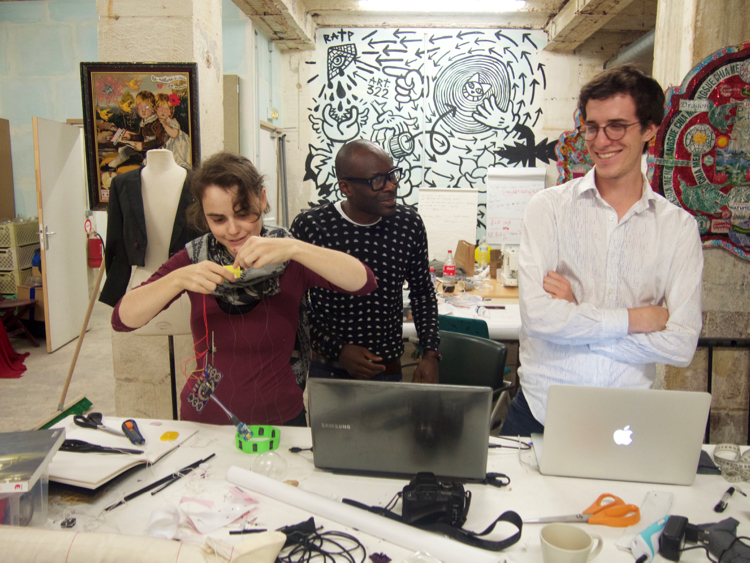
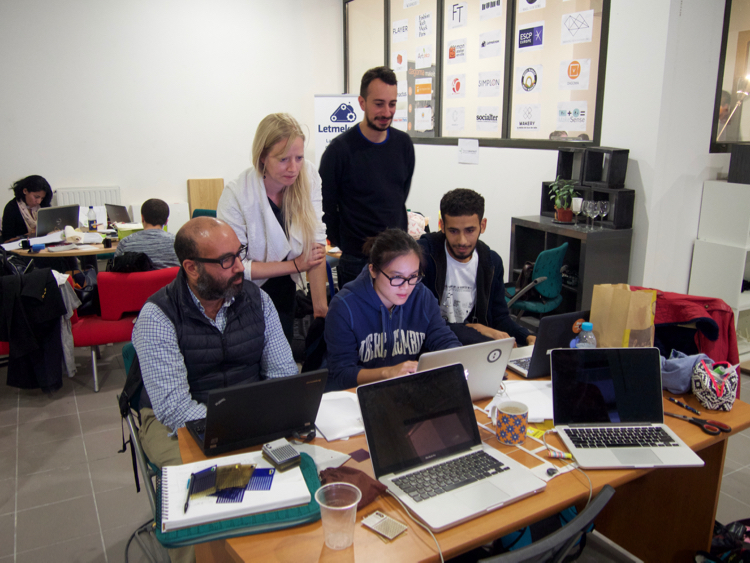
Of the five projects presented by the participants to the six-member jury (including Alice Audoin, founder of Change21, Axelle Tessandier of AXL, Kickstarter’s former representative in France, Marussia Rebeq, founder of the recyclable and ethical brand Andrea Crews, wearables specialist Cédric Honnet, CTO of Tangible Display), two caught our attention.
Jungle, “maison de couture” style
 Fashion Week diva Alice Giordani, textiles maker, mentor, and here, model. © Nicolas Barrial
Fashion Week diva Alice Giordani, textiles maker, mentor, and here, model. © Nicolas BarrialSupported by fashion accessory and clothes designers, the Jungle project (Jury Award) was the only one to present a modeled outfit : trendy overalls decorated with butterflies made from the infamous corn-based plastic.
On the technical side, a small fan on the shoulder emits a scent, according to the opened or closed position of the wings of the butterflies running down one of the straps. Simple, efficient, light and ephemeral, like a butterfly. The team explained how they wanted to appropriate a technology that they weren’t familiar with and exploit its savoir-faire in style.
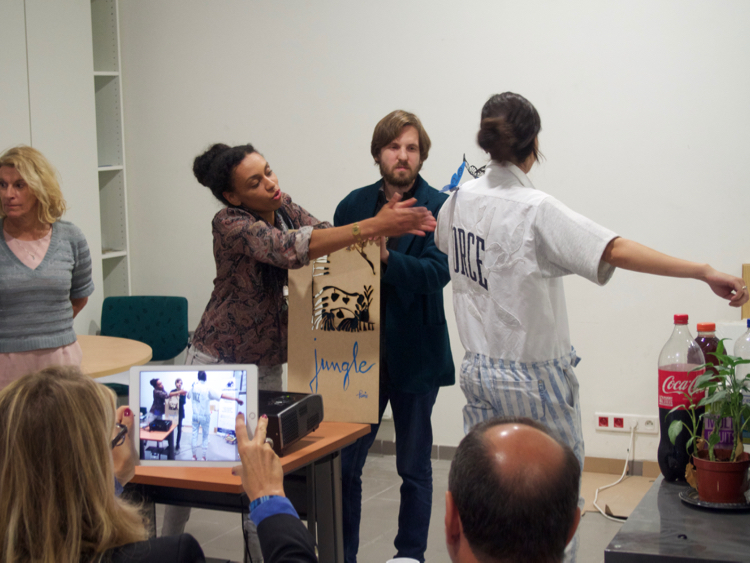
Smartglove, techno-sober first prize
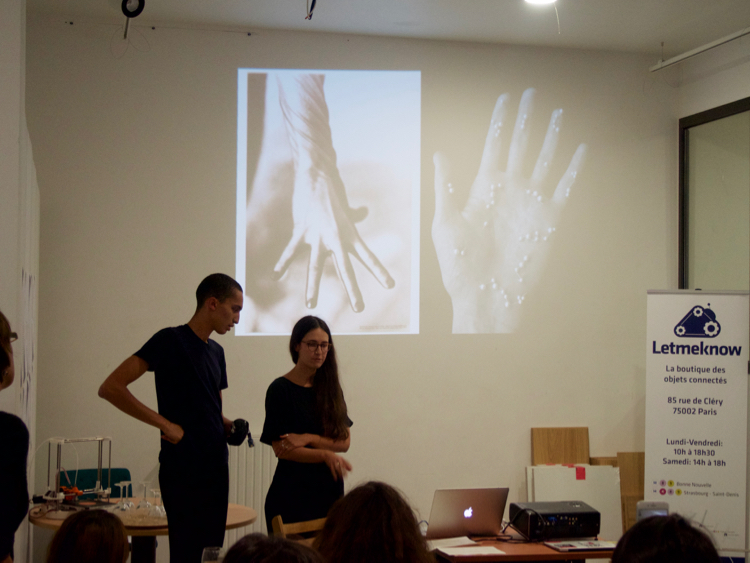

The SmartGlove (Greenathon champion) reprises smartphone gestures without the smartphone. The very serious presentation of the winning duo, Clara Daguin, freshly graduated from decorative arts, and Luca Fixy, business student, emphasized the economic convergence of objects through the example of a system that attributed to a garment (and the body) all the qualities of an interface.
Functional after only 50 hours of prototyping, the smart glove benefited from the support of Lucas Prado, a student from the Mines Nancy engineering school. The prototype may have appeared rather stark, fashionwise—a wool glove and aluminum foil to make contact with the Arduinos. But the demonstration exposed the lines of code that were displayed depending on the fingers making contact. The ergonomic research and its organic visuals finally stole the jury’s enthusiasm. The substance of the project is also interesting, as it questions the decreasing number of objects in our connected daily lives.
